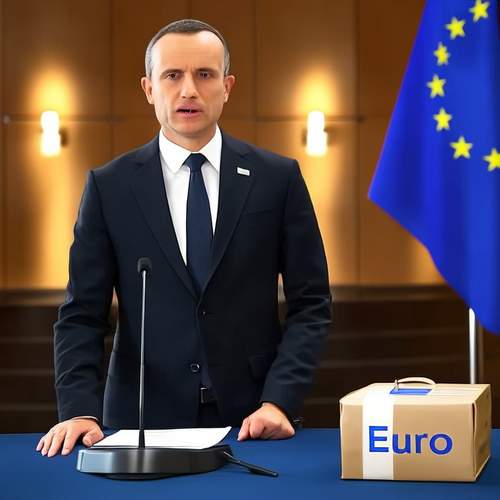In the intricate tapestry of immigration policies, the introduction of a new “gold card” visa program, as announced by Commerce Secretary Howard Lutnick, has sparked a whirlwind of discussion and speculation. This proposed visa, which promises permanent residency and work rights in the United States for a hefty price tag of $5 million, is not just a policy change but a significant shift in how the nation perceives and manages its immigration landscape. As we delve into the rhetoric surrounding this initiative, it becomes clear that the “gold card” is more than just a piece of plastic; it is a symbol of opportunity, ambition, and the complex interplay between wealth and citizenship.
The Promise of Prosperity
At its core, the “gold card” visa is being sold as a golden ticket to the American Dream. Secretary Lutnick’s announcement, made at the Axios “Building the Future” event, paints a picture of a future where the United States is flooded with wealthy, business-savvy individuals eager to invest in the country’s economy. The allure of this program is evident in Lutnick’s own words: “Basically, everyone I meet who is not an American is going to want to buy this card if they have the fiscal capacity.” This statement encapsulates the fundamental appeal of the “gold card”—it offers a direct pathway to citizenship for those who can afford it, positioning the United States as a premier destination for the world’s wealthiest individuals.
The promise of prosperity extends beyond the individual level. Lutnick envisions a scenario where these high-net-worth immigrants bring not just money but also business acumen and entrepreneurial spirit to the United States. The idea is that these “great people” will create jobs, stimulate economic growth, and ultimately contribute to the nation’s prosperity. The potential economic benefits are staggering: if 200,000 individuals were to purchase the “gold card,” the revenue generated could reach a trillion dollars, a sum that could significantly impact the US federal debt, which currently stands at over $36 trillion.
The Rhetoric of Exclusivity
The “gold card” visa program is inherently exclusive. With a price tag of $5 million, it is not an option for the average immigrant. This exclusivity is both a selling point and a point of contention. On one hand, it positions the United States as a premier destination for the world’s elite, suggesting that those who can afford the “gold card” are the cream of the crop, individuals who will bring significant value to the country. On the other hand, it raises questions about fairness and accessibility. Is citizenship a commodity that should be sold to the highest bidder? What message does this send to those who cannot afford such a price tag but still have much to contribute to American society?
The rhetoric of exclusivity is further emphasized by the comparison to the existing EB-5 immigrant investor visa program. While the EB-5 program requires a comparatively smaller investment of $1.8 million or $900,000 in economically distressed zones, the “gold card” represents a significant escalation in the financial barrier to entry. This shift from a program that targets a broader range of investors to one that caters exclusively to the ultra-wealthy underscores the growing emphasis on wealth as a determinant of immigration eligibility.
The Politics of Immigration
The introduction of the “gold card” visa is not just an economic initiative; it is also deeply rooted in the politics of immigration. Proposed by President Donald Trump in February, the program has been framed as a solution to the nation’s economic challenges and a means to attract the world’s wealthiest individuals. Trump’s vision is one where the United States becomes a magnet for global wealth, with the “gold card” serving as a conduit for economic growth and prosperity.
However, the politics of immigration are never straightforward. Immigration law experts have warned that creating a new visa program requires approval from Congress, a process that is fraught with challenges and potential pitfalls. The “gold card” program, while appealing in theory, must navigate the complex web of legislative and regulatory hurdles to become a reality. This underscores the broader debate surrounding immigration policy in the United States—a debate that is often polarized and deeply contentious.
The rhetoric surrounding the “gold card” visa reflects this complexity. While proponents argue that it will bring significant economic benefits and attract high-quality immigrants, critics raise concerns about fairness, accessibility, and the potential for exploitation. The program has the potential to exacerbate existing inequalities, creating a two-tiered system where citizenship is available to those who can afford it, while others are left behind.
The Ethical Dilemma
The “gold card” visa program presents an ethical dilemma that extends beyond the realm of economics and politics. At its heart, the program raises fundamental questions about the nature of citizenship and the values that underpin American society. Is citizenship a privilege that should be earned through merit, hard work, and contribution to the community, or is it a commodity that can be bought and sold?
The ethical implications of the “gold card” program are profound. By placing a price tag on citizenship, the program suggests that wealth is the ultimate determinant of worth. This notion is at odds with the traditional American values of equality, opportunity, and the pursuit of happiness. It also raises questions about the integrity of the immigration system and the potential for corruption and exploitation.
Moreover, the program’s emphasis on wealth as a criterion for immigration eligibility sends a powerful message about the nation’s priorities. In a time of growing economic inequality and social unrest, the introduction of the “gold card” visa may be seen as a reflection of a society that values wealth above all else. This could have far-reaching consequences for the social fabric of the United States, potentially widening the gap between the rich and the poor and undermining the principles of fairness and justice.
The proposed “gold card” visa program is a multifaceted initiative that touches on issues of economics, politics, and ethics. While it promises significant economic benefits and the potential to attract the world’s wealthiest individuals, it also raises profound questions about the nature of citizenship and the values that define American society. As the debate surrounding the program unfolds, it is essential to consider not just the economic implications but also the broader ethical and social ramifications.
The “gold card” visa is more than just a policy proposal; it is a reflection of the complex and often contradictory nature of American society. It is a symbol of opportunity and ambition, but also a reminder of the challenges and dilemmas that arise when wealth becomes a determinant of citizenship. As the United States navigates the path forward, the rhetoric surrounding the “gold card” visa will undoubtedly continue to shape the conversation about immigration, economics, and the future of the nation.



















